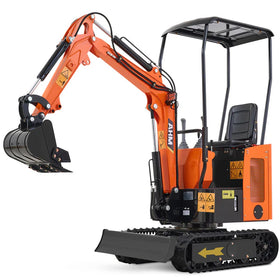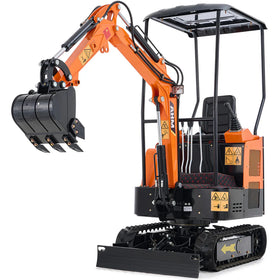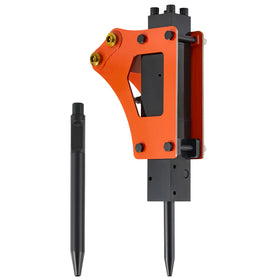You can save a lot of money buying a used mini excavator instead of a new one, but you need to know what to look for. After inspecting hundreds of machines throughout my career, I've developed a checklist that helps you avoid expensive mistakes.
Here's what I check before buying any used mini excavator:
1. Check Both Hours and Age - They Tell Different Stories
Don't just look at the hour meter. A machine with low hours isn't always a good deal.
I once looked at a 6-year-old excavator with only 1,200 hours. Sounds great, right? But it had been sitting unused for years. The seals were dry, and the hydraulic system needed a complete rebuild.
For most mini excavators, here's what I consider:
- Under 2,000 hours: Low usage
- 2,000-5,000 hours: Normal usage
- Over 5,000 hours: Plan for some major repairs soon
Check both the hour meter and when the machine was built. A newer machine with slightly more hours often beats an older one that's been sitting around.
2. Inspect the Undercarriage Carefully

The tracks and undercarriage can be the most expensive parts to fix. Get down on your hands and knees for this one.
Here's what to look for:
- Track pad wear: Standard rubber tracks should have at least 30% of original tread depth remaining. Anything less means replacement soon.
- Check if the rollers spin freely when you rotate the tracks.
- Look for oil leaks around the final drives.
-
Measure track sag: Standard specification is 1-1.5 inches (25-38mm) of deflection at the midpoint between carriers.
If the undercarriage needs work, it might cost $3,000-8,000 depending on the machine size. Use this knowledge when negotiating the price.
3. Test the Hydraulic System Under Load

The hydraulic system makes your excavator work. Testing it properly is simple.
First, run the used mini excavator until it warms up. Then:
- Raise the arm and bucket to full height and watch if they slowly sink.
- Run all functions at once to test the pump.
- Look for wet spots around cylinders and hoses.
- Check the color of the hydraulic fluid. It should be clear amber, not dark brown or milky.
Always test the machine digging in actual dirt. A machine might move fine when swinging in the air but struggle when working.
4. Listen to the Engine During a Cold Start
Start the machine when it's cold to spot problems. Here's what to watch for:
- Excessive smoke (white, black, or blue)
- Strange noises during startup
- How smoothly it runs after warming up
- Any warning lights on the dashboard
For diesel engines, startup compression pressure should be at least 350 psi (24 bar) for good performance. Low compression results in hard starting and poor power. Most mini excavators see a 5-8% decrease in compression over 2,000 operating hours, which is considered normal wear.
I always check how quickly the engine responds when increasing from idle to full throttle. A healthy engine responds quickly without hesitation.
5. Ask for Maintenance Records

Good owners keep records. Ask for:
- Oil change receipts
- Service records
- Repair history
- Warranty information
If the seller has detailed records, it usually means they've taken good care of the machine. No records? That's a red flag - assume the worst and lower your offer.
6. Consider Your Transport Setup
Before buying, think about how you'll move the machine:
- What does it weigh? Can your truck and trailer handle it?
- Will it fit through your typical job site gates?
- Is it the right size for the work you do most often?
I've seen people buy machines they can't easily transport, which creates all kinds of problems. Measure twice, buy once.
7. Research Parts Availability for That Model
Some brands are easier to maintain than others:
- Major brands like Kubota, Bobcat, and Caterpillar usually have better parts availability.
- Check if there's a dealer near you who services that brand.
- Search online for common problems with that specific model.
When evaluating parts availability, a good standard is the "48-hour test" - can you get critical components within 48 hours?
For common wear items like filters and hoses, same-day availability is ideal. The industry standard for parts obsolescence is typically 7-10 years after a model is discontinued, though major manufacturers often support their machines much longer.
I prefer machines from manufacturers with good dealer networks. Nothing is worse than a broken excavator and no parts available for weeks.
Conclusion

After checking everything, protect yourself:
- Get the deal in writing, including any repairs the seller promises.
- Take lots of photos during inspection.
- Make sure there are no liens against the equipment.
- Always get a proper bill of sale.
A good used mini excavator can save you thousands compared to buying new. Just take your time, inspect thoroughly, and don't rush the decision.
Note: This blog post reflects my personal experience inspecting and buying mini excavators throughout my career as a mechanical engineer. Your specific situation may vary, and it's always a good idea to consult with a mechanic if you're uncertain about a machine's condition.
Further Reading:
5 Ways to Make Money With Your Mini Excavator







